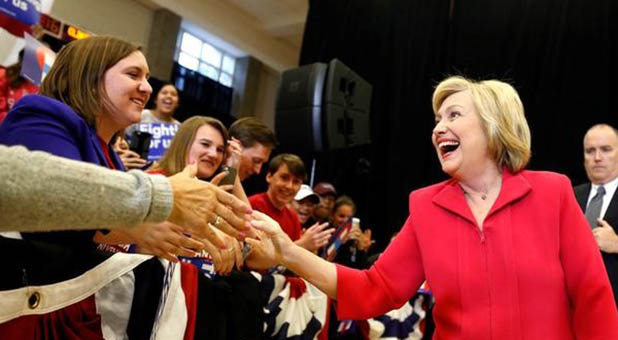What’s at Stake Tuesday in the Democrats’ Primaries
Voters in Oregon and Kentucky headed to the polls Tuesday in the continuing primary races for the Republican and Democratic presidential nominations.
Based on the current polling data, there could be an entirely new narrative in the presidential race come Wednesday morning. In Oregon, Republicans and Democrats alike were voting, while in Kentucky, only the Democrats were headed to the polls.
The question for Republicans is simple: Will presumptive nominee Donald Trump, who has not campaigned in several days, remain on track to secure the 1,237 delegates he needs to win the nomination at the national convention? He currently has 1,140 “soft”-pledged delegates, meaning he now needs just 97 more.
Oregon offers 28 more delegates, but awards delegates proportionately in vote-by-mail primary election that is closed to registered Republicans only. Based on past performance, this is a state that should have given Trump trouble, but his last-man-standing position may change the outcome somewhat.
Trump’s “on track” target for Oregon is eight delegates.
The really interesting story line is on the Democratic side. Of the 46 nominating contests held so far, former Secretary of State Hillary Clinton has only won 26, while U.S. Sen. Bernie Sanders (D-Vt.) has won 20.
That being said, as a result of her party’s “superdelegates,” Clinton is now just 163 delegates away from securing the nomination. Her lead over Sanders is now 742 delegates—but only 335 if you take away the superdelegates—which is seemingly insurmountable.
Sanders has momentum, however, and the email server scandal—among others—keeps rearing its ugly head at the most inopportune times for the former first lady. Superdelegates can vote for whomever they want at the national convention, and there’s enough of them that they could swing the nomination to Sanders.
Oregon offers 61 delegates, while Kentucky offers another 55, for a combined total of 116. Democrats don’t have winner-take-all states, so neither candidate is likely to get more than 65 delegates total. But there are an additional 18 superdelegates available—five in Kentucky and 13 in Oregon—that could play a big factor.
Will Clinton become the de facto Democratic nominee-in-waiting, or will Sanders’ late run of success continue, prompting even more questions—and chaos—over the front-runner’s electability?
Two months ago, Clinton was polling about 5 points better than Sanders, but the gap has narrowed even more. In Oregon, however, the former secretary of state is polling about 15 points ahead of the senator.




























































